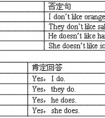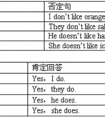What's the weather____in Lhasa?[ ]A. is like B. likeC. likes-四年级英语
题文
| What's the weather ____ in Lhasa? |
|
[ ] |
| A. is like B. like C. likes |
答案
| B |
据专家权威分析,试题“What's the weather____in Lhasa?[ ]A. is like B. likeC. ..”主要考查你对 介词 等考点的理解。关于这些考点的“档案”如下:
介词
考点名称:介词
- 介词:
是用来表示它后面的名词(代词)或起名词作用的短语、从句与句中其他成分之间的关系。
介词是英语中很活跃的词,一般置于名词之前。它常和名词或名词性词语构成介词短语。
同一个介词常和不同的词语搭配形成固定搭配,表示不同意义。 介词分类:
一、表示地点位置的介词
(1)at, in, on, to, for
at 表示在小地方;表示“在……附近,旁边”。
in 表示在大地方;表示“在……范围之内”。
on 表示毗邻,接壤,“在……上面”。
to 表示在……范围外,不强调是否接壤;或“到……”。
(2)above, over, on 在……上
above 指在……上方,不强调是否垂直,与below相对;
over 指垂直的上方,与under相对,但over与物体有一定的空间,不直接接触。
on 表示某物体上面并与之接触。
例:The bird is flying above my head. 小鸟在我的头上飞。
There is a bridge over the river. 在河上有一座桥。
He put his watch on the desk.他把他的表放在了桌子上。
(3)below, under在……下面
under 表示在……正下方
below 表示在……下,不一定在正下方
例:There is a cat under the table. 桌子底下有一只猫。
Please write your name below the line. 请在横线下写上你的名字。
(4)beside,behind beside 表示在……旁边
behind 表示在……后面
二、表示时间的介词
(1)in,on,at在……时
A、in表示较长时间,如世纪、朝代、时代、年、季节、月及一般(非特指)的早、中、晚等。
如:inthe1950s, in1989, insummer, inJanuary, inthemorning等。
B、on 表示具体某一天及其早、中、晚。
如:on May 1st, on Monday, onNew Year’s Day, on a cold night in January, on a fine morning, on Sunday afternoon等。
C、at 表示某一时刻或较短暂的时间,或泛指圣诞节,复活节等。
如:at 3:20, at this time of year, at the beginning of, at the end of, at the age of, at Christmas, at night, at noon, at this moment等。
(2)after在……之后 “after+一段时间”表示过去的一段时间以后;
“after+将来的时间点”表示将来的某一时刻以后。
三、其它常用介词
(1)about关于,附近,大约,周围,随身.
I have bought a book about Shakespearean. 我买了一本有关莎士比亚的书。
There are about fifteen trees in the picture. 大约有十五棵树在图片里。
(2)across横过,对面,交叉,在……的对面
Can you swim across the river? 你能游过河吗?
We live across the street. 我们住在街的对面。
(3)along沿着,顺着.
They are walking along the river. 他们沿着河行走。
(4)by 被……,在……的近旁,在……之前,不迟于,以……为手段。
The class room was cleaned by the students. 教室由学生们打扫干净了。
Miss Lucy came to China by air. 露西小姐是乘飞机来中国的。
(5)for为……,因为……,至于……。
He works for this company. 他为这家公司工作。
She came back to the classroom for she had lef the books in the class room. 她返回到教室是因为把书留在了那里。
(6)from从……,来自……,因为……
Where are you from? 你是哪里人?
He diedf rom an accident. 他死于一场事故。
(7)of……的,属于……
This is a map of China.这是一张中国地图。
(8)with使用、和……在一起
We write with a pen. 我们用笔写字。
Can you go to the park with me? 你能和我一起去公园吗?
注意:在last, next, this, that, some, every 等词之前一律不用介词。如:We meet every day.小学常见介词:
1.on
(1) 在------上面 The book is on the desk.
(2) 在------(哪一天/星期)What do you do on Wednesday?
(3) 在------(月、日)My birthday is on August 2nd.
2. in
(1)在------里面 The pens are in the pencil-box.
(2)在------(哪一年/月)His birthday is in October.
He worked here in 1992.
(3 ) 在------(地方) He works in Dongguan.
(4 ) 在------之内 What are you going to do in 20 years?
(5 ) 在------(早上、下午、晚上)
I do morning exercises in the morning every day.
I usually play basketball in the afternoon.
I often do my homework in the evening.
3. under
在------底下 There is a ball under the bed.
- 最新内容
- 相关内容
- 网友推荐
- 图文推荐
| [家长教育] 孩子为什么会和父母感情疏离? (2019-07-14) |
| [教师分享] 给远方姐姐的一封信 (2018-11-07) |
| [教师分享] 伸缩门 (2018-11-07) |
| [教师分享] 回家乡 (2018-11-07) |
| [教师分享] 是风味也是人间 (2018-11-07) |
| [教师分享] 一句格言的启示 (2018-11-07) |
| [教师分享] 无规矩不成方圆 (2018-11-07) |
| [教师分享] 第十届全国教育名家论坛有感(二) (2018-11-07) |
| [教师分享] 贪玩的小狗 (2018-11-07) |
| [教师分享] 未命名文章 (2018-11-07) |


![Where is my bag? It's _____________the desk. [ ]A. inB. behindC. on-五年级英语](http://www.00-edu.com/d/file/ks/4/1/44/2019-08-20/small3591750882d019139d20d416cb80f64f1566236486.jpg)
![Where's my pen? [ ]A. It's in the desk.B. It's under the desk.C. It's on the desk.-四年级英语](http://www.00-edu.com/d/file/ks/4/1/44/2019-08-20/small4157828d9d6bc1a02bdbdd4d3ffccde61566236790.jpg)

![I can call you _____________ the phone.[ ]A. inB. atC. onD. of-六年级英语](http://www.00-edu.com/d/file/ks/4/1/44/2019-08-20/small17adfe158040ebb20380cac1c81e7ec81566232881.jpg)
